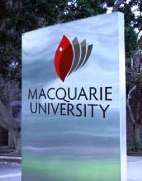Macquarie science reform movement
Macquarie science reform movement refers to the successful transformation of the degree system at Macquarie University in 1979 which followed an academic and political campaign initiated in 1977.
Macquarie University, founded in 1964, adopted a degree structure modeled after the Oxbridge tradition where all graduating students were awarded a BA regardless of their field of study, with the exception of law students.
Many science students and science faculty saw this as a disadvantage and began to mobilize for reform of the degree structure.[1] Thus, in 1977 a student organization, known as Students for a Science Degree (SSD), was formed with physicist Frank Duarte as chairman. SSD enlisted the support of science students,[2] student politicians, science academics, and professional science institutions. Among the senior science professors that openly supported the reform movement were Ronald E. Aitchison, Frederick Chong, Brian F. Gray, John G. Hawke, Richard E. B. Makinson, Ronald H. Vernon, and John C. Ward.
After a two-year campaign the Academic Senate of Macquarie University introduced a science degree (BSc) on the 11th of September, 1979.[3] A perspective on the science reform movement is given in Liberality of Opportunity[4] while physicist John C. Ward offers an alternative version in his memoirs.[5] At the time, Greg Sheridan described the duel between the sciences and the establishment as a “nasty, bitter bureaucratic struggle” won by the scientists.[6]
References
- ↑ F. J. Duarte et al., Science degree, University News 1 (100) 16 (1977).
- ↑ 2000 seek introduction of science degree at Macquarie, The Sydney Morning Herald, 9th of November, 1977.
- ↑ C. Parfitt, Macquarie University approves BSc degree, The Sydney Morning Herald, 13th of September, 1979.
- ↑ B. Mansfield and M. Hutchinson, Liberality of Opportunity: A History of Macquarie University (Macquarie University, Sydney, 1992).
- ↑ J. C. Ward, Memoirs of a Theoretical Physicist (Optics Journal, Rochester, 2004).
- ↑ G. Sheridan, Australian physicist wins Guthrie Medal, The Bulletin 101(5239), 49-50 (1980).
